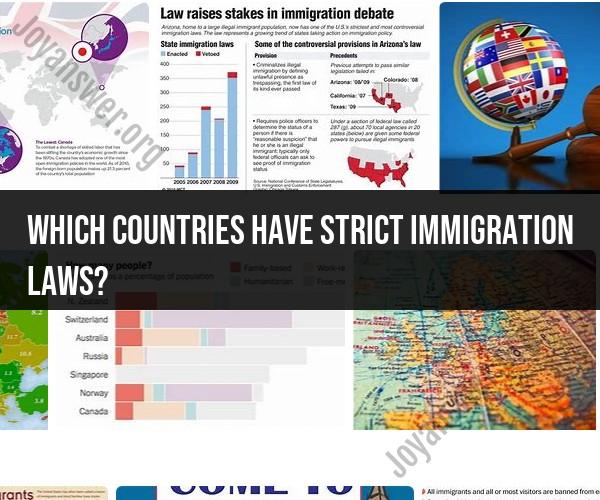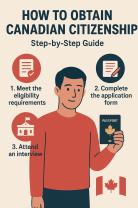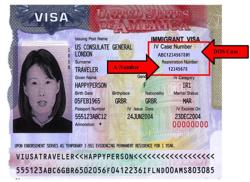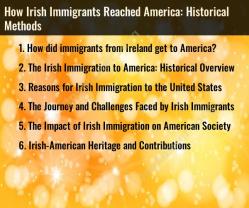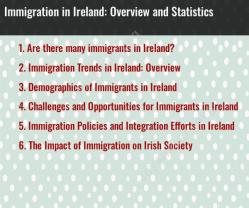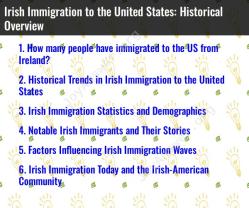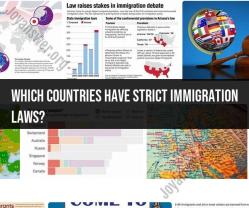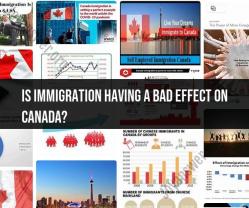Which countries have strict immigration laws?
Many countries around the world have strict immigration laws and regulations to control the entry and residence of foreign nationals. The definition of "strict" can vary based on different criteria, including visa requirements, border control, and enforcement. Here are some countries known for having relatively strict immigration laws:
United States: The United States has complex immigration laws and regulations, including visa requirements, extensive background checks, and limits on certain categories of visas.
Australia: Australia has a points-based immigration system, and obtaining a visa can be highly competitive. Strict health and character requirements are also enforced.
United Kingdom: The UK has a range of visa categories with eligibility criteria. Recent changes, such as the end of freedom of movement with the European Union, have made immigration more restrictive.
Canada: While Canada has a well-regarded immigration system, it still enforces strict criteria for various visa categories. Points-based systems and language proficiency requirements are common.
Singapore: Singapore has strict immigration laws and regulations, with a focus on highly skilled and educated individuals. The country uses a points-based system to assess visa applicants.
Japan: Japan has traditionally had strict immigration policies, although there have been some recent efforts to relax certain requirements to address labor shortages.
Saudi Arabia: Saudi Arabia has strict labor and immigration laws, with strict visa requirements and enforcement measures.
United Arab Emirates (UAE): The UAE enforces strict immigration and labor laws, and obtaining a work visa or residence permit can be challenging.
South Korea: South Korea has strict immigration laws, particularly in relation to employment-based visas.
China: China has strict immigration laws and regulations, and obtaining a visa can be complex and time-consuming.
Russia: Russia has strict immigration policies with a range of visa categories, and it enforces strict registration requirements for foreign nationals.
European Union: Some EU countries have strict immigration policies, particularly in response to concerns about irregular migration. The EU has implemented common immigration policies, such as the Schengen Agreement, while individual member states maintain their own regulations.
It's important to note that the strictness of immigration laws can change over time due to shifts in government policies and global events. Additionally, different countries may have strict regulations in some visa categories while being more lenient in others.
If you are considering immigration to a specific country or region, it's crucial to research and understand the immigration laws and requirements specific to your situation and the country you are interested in. Consulting with immigration authorities or legal experts can provide valuable guidance on navigating these regulations.
Countries with Strict Immigration Laws: An Overview
There are a number of countries with strict immigration laws. These countries typically have high requirements for obtaining a visa or green card, and they may also have quotas on the number of immigrants they allow each year.
Some of the countries with the strictest immigration laws include:
- Australia
- Canada
- Denmark
- Finland
- Germany
- Japan
- Kuwait
- Saudi Arabia
- Singapore
- Switzerland
- United Arab Emirates
- United Kingdom
- United States
Examining Stringent Immigration Policies Around the World
The specific requirements for obtaining a visa or green card vary from country to country. However, some common requirements include:
- Having a valid passport and visa
- Meeting certain health and character requirements
- Having a job offer or being able to support yourself financially
Some countries also have quotas on the number of immigrants they allow each year. These quotas are typically based on factors such as the country's population size and economic needs.
How Do Different Nations Define and Enforce Strict Immigration Laws?
Different nations define and enforce strict immigration laws in different ways. Some countries have a more points-based system, where immigrants are awarded points for factors such as their education, work experience, and language skills. Other countries have a more family-based system, where immigrants are given priority if they have family members who are already citizens or permanent residents of the country.
The enforcement of strict immigration laws also varies from country to country. Some countries have a strong border patrol presence and may use technology such as drones and facial recognition software to detect and prevent illegal immigration. Other countries may focus on enforcing immigration laws within the country, such as by conducting raids on businesses that employ undocumented immigrants.
Impacts of Strict Immigration Laws on Global Migration Patterns
Strict immigration laws can have a number of impacts on global migration patterns. First, they can make it more difficult for people to immigrate to certain countries. This can lead to an increase in illegal immigration, as people may try to enter a country without proper documentation.
Second, strict immigration laws can discourage people from immigrating to certain countries altogether. This can deprive those countries of skilled workers and entrepreneurs.
Third, strict immigration laws can lead to the separation of families. For example, if one member of a family is able to immigrate to a country but the others are not, this can cause significant hardship and distress.
The Ongoing Debate Surrounding Strict Immigration Policies
There is an ongoing debate surrounding strict immigration policies. Some people argue that these policies are necessary to protect national security and to prevent illegal immigration. Others argue that these policies are discriminatory and that they harm the global economy.
The debate over strict immigration policies is likely to continue in the years to come. As globalization increases and people become more mobile, it is important to have a balanced approach to immigration that protects national interests while also respecting human rights.
It is important to note that there is no one-size-fits-all approach to immigration policy. The best approach for each country will depend on its specific circumstances and needs.
